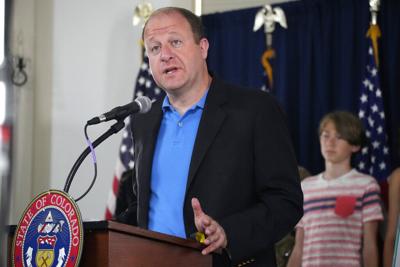Gov. Jared Polis laid out five responses Thursday the state is enacting or preparing to enact should the rise in COVID-19 hospitalizations not rapidly reverse in the coming days.
He made no mention of a broad public health order like masking.
Hospitals are at their most stressed point in the pandemic thus far, state and facility officials have said in recent days. This is due to several factors, including COVID-19 and staffing struggles. State leaders have repeatedly expressed concern about the "tight" intensive care and acute care beds statewide. As the trend continues, Polis said Thursday that the state has already begun to respond.
The "tools" the state has in its "tool belt," as Polis described it, include:
- requesting medical teams from the Federal Emergency Management Administration;
- a temporarily order a stop to cosmetic and elective procedures;
- reactivation of the crisis standards of care, which allow hospitals to change transfer, staffing and, in a worst-case scenario, triage systems to prioritize the use of scarce beds and resources;
- a new executive order regarding patient transfers; and
- the stepped-up deployment of monoclonal antibody treatment to people infected with COVID-19.
Asked if a health order, like masking, was also being considered, Polis pivoted back to those five options. Other state health officials told reporters earlier this week that they were continuing to rely on local leaders to enact their own policies as they see fit. Boulder and Larimer counties have both instituted mask orders of late.
The state ceded control of the pandemic response to local authorities since the late spring, when the pandemic appeared to be receding and vaccines were rolling out steadily. As cases have steadily risen in recent months, the governor has said repeatedly that hospitalizations are his primary benchmark in deciding any statewide action. But other than vague comments about potential policy responses, he and state health officials have not indicated an imminent health order that would affect day-to-day life for Coloradans.
Polis said he didn't anticipate cases or hospitalizations dropping in the coming days and that at least two or three of those five options would likely be activated soon.
Already, the state is preparing to launch five mobile buses to dole out the antibody course statewide. The treatment has been found to reduce hospitalizations in symptomatic cases, though it's most effective when administered shortly after symptoms begin. Two of those buses will be deployed beginning Monday, the governor said.
The goal now is to take the treatment out of hospitals, freeing up space and staff, and into mobile clinics and other care settings. Cara Welch, spokeswoman for the Colorado Hospital Association, said Wednesday that the treatment has primarily been distributed in hospitals up to this point and that, with repeated COVID-19 surges, those facilities have often been too busy or too short-staffed to be proactive in using the drug.
Parts of the crisis standards of care were enacted for much of the first year of the pandemic, particularly to help hospitals struggling with staffing and access to protective equipment. But a critical provision of the standards also provide hospitals the ability to triage beds, ventilators or care generally, should their capacity — thanks to a surge or staffing — be overwhelmed. Officials have long said that is a worse-case scenario.
Eric France, the state's chief medical officer, told reporters Thursday that the staffing portion of the crisis standards of care is "likely to be activated" soon. He said he will also consider looking at the "principals of triaging" scarce resources, as was seen in some, more desperate situations elsewhere in the United States.
The delay of elective — which often translates to non-emergency — procedures was universal during the first several months of the pandemic, as hospitals protected bed space and resources. Many have expressed hesitancy to do so again: The downstream effects of delayed care are beginning to wash over facilities, as patients with more advanced conditions begin to fill hospital beds.
But with the current surge, Polis said cosmetic and elective procedures may again be halted. UCHealth has already begun "scaling back" some procedures, an official there told The Gazette this week, though HealthONE, another major system, said it had not taken that step yet.
The governor continued to hammer the pandemic as it stands today as one "of the unvaccinated." More than 72% of the state's 12-and-older population are fully vaccinated, and more than three-quarters of current COVID-19 hospitalizations are among the unvaccinated, according to state data.
Polis said that the average age of a vaccinated Coloradan in the hospital is 73; those older residents have both been far more susceptible to severe disease and were among the first to be vaccinated, which, officials have said, may mean their immunity has waned further than others.
But the average age of unvaccinated patients, Polis said, is 57. Of 31 people who've died from the virus recently and are between the ages of 12 and 40, Polis said all but one was unvaccinated; the lone inoculated death had a "terminal illness" that further complicated his situation.
The vast majority of recent deaths in older populations have also been among the unvaccinated, he said.
"If you're under 40 and you haven't been vaccinated, just look at the data," he said. "This is a deadly virus to you now. You're really rolling the dice if you get it."






 Your Privacy Choices
Your Privacy Choices